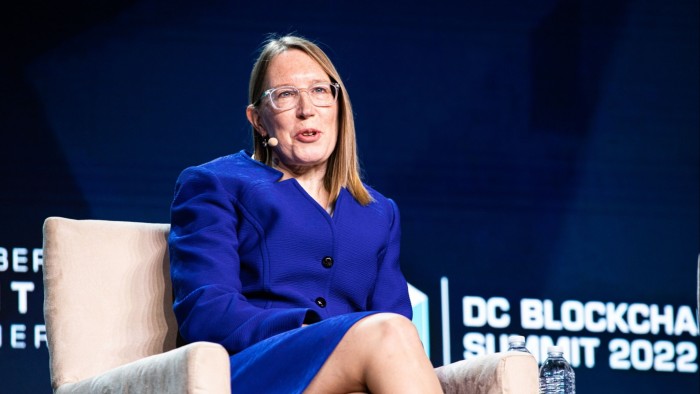Stay informed with free updates
Simply sign up to the Cryptocurrencies myFT Digest — delivered directly to your inbox.
We try, valued reader. We really do try. We want to approach all types of tokenised finance with an open mind. Maybe one day, someone will invent something to do with a blockchain that’s not crime, self-enriching grift, black-box frippery, or a distributed Ponzi scheme. We’re ready to reverse ferret a long-standing editorial line, should useful innovation ever happen, so we need to put in the work.
But sometimes . . . but sometimes . . . we just want to skip all that and show you a press release. Here’s a press release:
Hello,
Big news from IoTeX! We’ve just rolled out a major integration that brings Wall Street to Web3: the ioPay wallet now fully supports @xStocksFi synthetic stock tickers, allowing users to trade U.S. equities like $NVDAX (NVIDIA), $MSTRX (MicroStrategy), and $TSLAX (Tesla) — directly with crypto.
This marks a major step in making traditional asset access as seamless and decentralized as any DeFi token swap. Powered by the speed and transparency of blockchain, users can now:
Invest in real-world stock derivatives using stablecoins or crypto
Manage both DePIN assets and stock exposure from one unified wallet
Tap into traditional markets without KYC or intermediaries
“This is where decentralized finance becomes truly global,” said Raullen Chai, Co-Founder of IoTeX. “With xStocks on ioPay, we’re proving that you don’t need to be in New York or own a brokerage account to invest in the most important companies of our time.”
One of the crypto industry’s latest wheezes is to tokenise stocks. It started with Robinhood putting hot privately held stocks like OpenAI and SpaceX on a blockchain then selling connected tokens to non-US customers, in a structure not unlike those companies that sell you a square foot of Highland scrubland and a certificate that says you’re now Lady of Glencoe.
Several companies have jumped on the bandwagon and are trying to sell tokenized public stocks, which they say are backed one-for-one with real world equity. The innovation is to create a kind of perpetual swap that looks to any sensible regulator exactly like a security while carrying none of the legal dibs on the underlying security.
Commissioner Hester Peirce, of the SEC’s Crypto Task Force, last week issued a withering statement about the whole shambola:
Tokenization may facilitate capital formation and enhance investors’ ability to use their assets as collateral. Enchanted by these possibilities, new entrants and many traditional firms are embracing onchain products. As powerful as blockchain technology is, it does not have magical abilities to transform the nature of the underlying asset. Tokenized securities are still securities. Accordingly, market participants must consider — and adhere to — the federal securities laws when transacting in these instruments.
To be fair, there are a few reasons why a person might prefer to own a private market IOU for a stock rather than a stock. Maybe they want 24 hour trading, or put more trust in settlement by distributed ledger than via a regulated broker, or just want to swap tokens for other tokens via liquidity exchanges that promise a quasi form of tokenised interest.
Perhaps, as various guys have claimed, tokenising equity creates a “neutral, public-good asset class” that’s “a foundational upgrade to the financial system itself.”
Or maybe it’s aimed for people want to “tap into traditional markets without KYC”. Thanks to California-based IoTeX for saying the quiet part out loud.
https://www.ft.com/content/b7381ab8-2596-4036-b2e4-741c3375cf10


